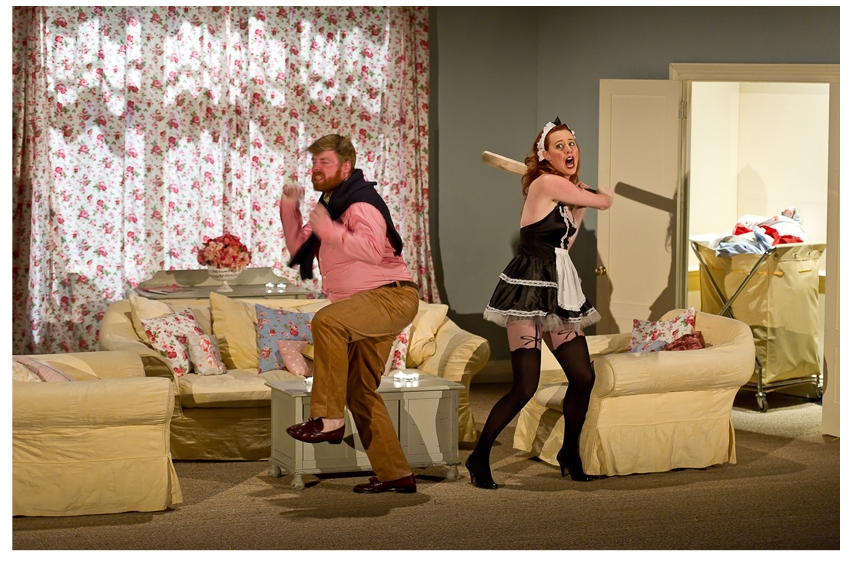The time of year is approaching when Nutcrackers take over from opera, and then a further round of Traviatas gets under way. But that does at least mean that it’s also the time when the schools of music put on their end-of-term operas, and this season is unusually promising. Next week Sir Colin Davis is conducting Berlioz’s Béatrice et Bénédict at the Royal Academy of Music, and the week after the Royal College of Music is staging two equally rare Bizet operas, Djamileh and Le Docteur Miracle.
I doubt whether either of them will give me more, or as much, pleasure as the Guildhall School’s production of Nicolai’s Die lustigen Weiber von Windsor (The Merry Wives). This was one of the most polished efforts I have seen at the Guildhall School, with some truly remarkable singers and an orchestra which was on exceptionally fine form, with a few lapses; that speaks strongly for Clive Timms, who has conducted an immense range of operas, always idiomatically.
The question always arises with The Merry Wives: was it worth doing? Though it retains a minor place in the repertoire of German-speaking countries, elsewhere it is inevitably compared with Verdi’s Falstaff, and naturally to Nicolai’s disadvantage. Of course, it isn’t such a great opera as Falstaff, in fact, it isn’t a great opera at all, but neither are plenty of others that we get far more chances to see. There is an odd prejudice, which has lasted now for a long time, in favour of Italian operas of more or less any period over ones from Germany or, for that matter, France. Merry Wives is unarguably much more enjoyable than many of Verdi’s early operas, or than most of Donizetti’s. But it offers less opportunity for singers to show off, and thus for a familiar kind of opera buff to writhe in pleasure at.
Nicolai has his place in a tradition that is largely neglected nowadays, except to some extent at Wexford, and whose most illustrious member is Weber — also largely neglected — and includes Marschner and Lortzing, and even, though not so much operatically, Mendelssohn, a friend of Nicolai, and an exact contemporary. Think of A Midsummer Night’s Dream Overture when you listen to the equally ravishing Merry Wives Overture, and the influence is clear and wholly beneficial. What none of the 19th-century German composers had was the genius to create or persuade someone to write a satisfactory libretto — always obviously excepting Wagner. The Merry Wives sticks far closer to the shape of Shakespeare’s play than Falstaff does, and wholly to its disadvantage. There are too many characters, too many incidents, for the conventional length, and the work lacks a dramatic focus. Jealousy plays a much larger role than it does in Falstaff, though there isn’t much to learn about it from Fluth’s rants, impressively though they were sung by Victor Sicard on the first night. Falstaff has a surprisingly small part to play, and not a great deal of music to sing. He’d have made more of an impact here if there had been any attempt to make him look older, or more convincingly paunchy.
Overall the production was extremely strong, but everyone looked about the same age. It is set in the 1950s, and ingeniously the scenery moved sideways, so there were never any breaks in the music, because one scene slid out of view for another to appear. Shouldn’t every opera house do this, always?
The star of the show, and by an immense margin, was the Frau Fluth of Sky Ingram, a tall, sexy Australian with a figure that enabled her to strip plausibly to minimal dominatrix gear, and a voice which could do anything Nicolai wanted, which in Frau Fluth’s case is a great deal. Surely she will appear with a major company as soon as she graduates. Like the other women, she showed a delightful sense of humour. The men are a dourer lot, and in one scene were shown to be managers, except of course for Falstaff, who remains, in the opera and the production, ill defined. The love interest between Fenton and Anna involves them in lengthy duets, which, like a lot of the music, aren’t quite memorable.
For someone who could pour out such wonderful melodies as Nicolai does in the Overture, he shows a strange parsimony later on — one longs for a reprise of the great tune, but it doesn’t come: it had to wait for Meistersinger, a marvellous theft which Wagner cheerfully acknowledged. I realise I’m not building up a great case for Merry Wives, but it is almost continuous fun, and it’s a pity that the Guildhall School mounted only four performances. The first was packed and the reception was rightly rapturous.






Comments